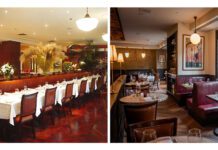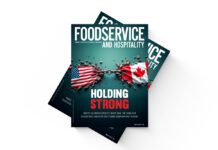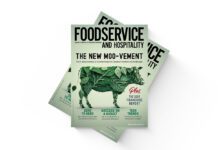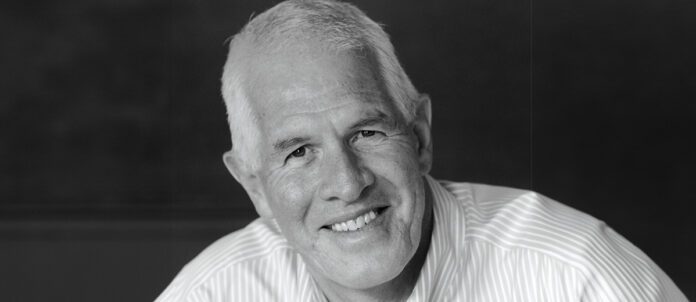Peter Oliver’s legacy on the foodservice-and-hospitality industry is long lasting and far reaching. The respected entrepreneur never set out to be a restaurateur but ended up becoming one of the industry’s most successful operators and icons, and also its most passionate advocate and champion, building an empire that includes a total of 69 restaurants and event spaces, including 24 under the O&B banner with an additional 45 units that form a part of the company’s strategic partnerships, employing 3,950 employees across the country.
Born in Cape Town, South Africa on July 30, 1948, Oliver moved to Canada in 1967 to study Business at Montreal’s McGill University. Upon graduation, and after paying off his student loans, he returned home for a short time, before deciding to move permanently to Canada, where on his arrival he proposed marriage to Maureen Murphy, an Air Canada flight attendant he met in 1968. The couple married in 1974 and subsequently, Oliver began a career, first as a stock broker and then as a commercial real-estate broker.
It was only after getting his first restaurant real-estate listing — a bakery café located at Yonge and Eglinton that he decided to try his hand at owning a sandwich shop, “believing he could serve a better sandwich than anyone else,” quips his son Andrew, who now helms O&B, adding that sandwich shop, Oliver’s Bakery Café, “grew into a restaurant that grew into an empire.”
Once Oliver’s Bakery became successful against the odds, it proved he had made the right decision, and with no previous background in the industry, Oliver charted a course for success that’s both remarkable and unrivalled, spawning a cadre of successful, leaders dotted across the Canadian hospitality landscape, many of whom he nurtured and mentored. It’s hard to look at the restaurant landscape and not feel the tentacles of Oliver’s tutelage at play — from countless chefs, such as Anthony Walsh and John Horne, who were groomed in the O&B family, to many others who have opened their own restaurants and businesses and continue to impart the values and wisdom they gained working alongside the great visionary.
Of course, Oliver’s relationship with chef Michael Bonacini was central to his success, a fact Oliver repeatedly acknowledged. As an astute businessman, he knew to truly succeed in the foodservice industry he needed to hitch his wagon to a star chef who knew the world of food inside out. Bonacini was that chef.
Oliver tried repeatedly through the years to entice the celebrity chef into a partnership, but it wasn’t until 1992 that the two teamed up. “Peter came along with the opportunity to have some equity ownership in a restaurant, which I personally was looking for,” explains Bonacini. Together, the two created a company that changed the trajectory of many lives and which became the gold standard for other operators to replicate.
“Peter is, and always was a great communicator, engaging to listen to,” recalls Bonacini. “He would always have big ideas and a vision and spoke about this new restaurant that he had in mind to do downtown. We both agreed it would be like Union Square Café in New York. There was this tangible icon and a restaurant that we both felt so strongly about, about what it stood for and what it represented — longevity, commitment to excellence. It was serious food but it wasn’t fine dining, it was very accessible but worked well for New York City, for businesspeople, for the visitors to the city and that’s what we wanted to create at Jump.”
It was Peter’s vision for that restaurant that stoked a fire in Bonacini and brought the two icons together to create a framework for a partnership and a legacy that would last for more than three decades. But beyond that new restaurant, Jump, “Peter wanted to build a company that stood for something and that everyone could be proud of, that people felt a part of something unique and special, but most importantly lasting. Part of our philosophy is we wanted our restaurants designed to be of timeless quality. We looked at O&B as Four Seasons meets Cirque du Soleil, two iconic Canadian businesses that are world class, respected and revered. Four Seasons because of its pure driven guest-satisfaction, hospitality and exacting standards and Cirque du Soleil [because it promoted] expecting the unexpected, the excitement of innovation and creativity.”
What made Oliver so compelling and impactful? Standing 6’4″, his towering presence, along with his perpetual smile, and his endless charm, meant Oliver could convince anyone to follow the leader. He dreamt big and lead with care while fastidiously creating a positive workplace culture where employees were valued and, where they in turn, delivered exceptional customer service; he relished developing staff and pushing them out of their comfort zones; and he believed and insisted that the foodservice-and-hospitality industry could always be better.
At the core of what made Oliver eminently successful were his leadership skills. “He was a ferocious leader,” says Bonacini and as “genuine individual as you could ever want to meet. He loved life. He was excited about our industry and he was a huge ambassador. The value that he put upon the employees was inspiring. “I’ve never known anyone with more natural leadership ability,” says Theresa Suraci, marketing manager, O&B. Suraci worked with Oliver for more than 25 years. “When Peter walked into a room, all eyes were on him, in part due to his commanding stature, but also because he knew instinctively how to share his vision for something and get everyone excited. Whether that was a new service idea for the restaurants, a fresh way of canvassing for a bike-a-thon, or maybe planning the most amazing staff party ever, Peter’s passion and energy were so compelling that those around him had no choice but to step up and help.
“Larger than life, charismatic, and relentlessly positive, Peter took on the world with a zest for living and a can-do attitude,” adds Suraci. “He had big dreams for O&B; actually, he had big dreams for everything he really cared about — his family, his friends, and giving back to his many communities.”
Bruce McAdams, associate professor at the University of Guelph, agrees with Suraci: “Peter had an ability to dream big, really big. In many ways his dreams were unrealistic but when he shared them, you walked away believing you could make them come true anyway. He did this with an even hand; it didn’t matter if you were the head chef or a part-time hostess, Peter made everyone feel they were the most important person in the company.”
Adds McAdams, “Peter’s strength was bringing humanity to his role as leader of the company. The thing that made Peter different was his incredible determination to understand the human condition. He looked at restaurants intellectually, almost like a social experiment. To Peter, restaurants were about the people, the employees and guests, and the experiences and relationships that resulted from the preparation and sharing of a meal. Restaurants not only provided work, but an opportunity for people to reach their potential. That is what made Peter different; that is what made Peter special.”
Scott Bellhouse, owner of Bellhouse Hospitality, a Victoria B.C.-based recruitment company, who got his start with O&B as assistant manager at Jump, eventually growing into the role of Director of Operations, says “Peter knew how to recognize talent and hired great people (you either have that skill or you don’t, in my opinion). He knew how to motivate his best people and get the most out of them.”
According to son Andrew, “He saw his primary responsibility as being Chief Inspiration Officer, passionately championing the company vision and values towards the goal of developing a strong corporate culture. He was a natural born leader with the skills to excite, influence and rally/unite those around him. He was also a seasoned cheerleader and it brought him so much joy and satisfaction seeing others reach their potential, especially if he was able to play a helping hand in that.”
What made Oliver such a great leader was his fanatical obsession in creating a positive workplace culture. Phil Wylie, who today serves as VP of Human Resources, recalls the fastidious process of being interviewed by Oliver before he was hired. “Peter hired me in 2012 after an extensive search and intensive interview process. Before I got the job, Peter had me meet with eight other people in the company and he needed a strategic human resources plan for O&B — he made me do three iterations before we settled on a plan with eight priorities and more than 150 action steps. I remember at first thinking that he was a little obsessive, but I came in time to realize that he went to these extremes because he valued culture so much; and to be hiring an outsider to be charged with all people and culture initiatives was something he didn’t want to mess up.”
While many restaurateurs are known to fly by the seat of their pants, Oliver was razor focused in his approach to being professional – even, when the company was still in its infancy. “When I first joined O&B, Peter had a dream of creating a company handbook,” recalls Suraci. “Although there were only two restaurants at that time, he believed if he could explain the company’s vision and values to employees clearly in black and white, he could establish the roadmap for our future growth and success. He had a folder full of scraps of handwritten notes, letters from guests, inspirational quotes and scribbled napkins from impromptu meetings with Michael — a mishmash of thoughts that had resonated with him over the years as to what true hospitality really meant. Bit by bit, we pieced it together into a manual, along with Peter’s elegant narrative, and that handbook is what has become the de facto playbook for the company.”
He so enjoyed meeting with new hires that he took each new hire out to Auberge du Pommier for four-hour orientation lunches. “Peter was sometimes reticent to change; he very much wanted to continue to host his ‘Peter Oliver Orientations’ — even when I explained to him that he didn’t have enough days in the calendar to keep up with the number of employees that had been hired,” says Wylie. “As we continued to work together, he came to appreciate the ways we kept the spirit of the early culture alive within the larger group; even if we had by the very nature of our success, evolved the culture into something new.”
Oliver had as much time “for the dishwashers as for the most celebrated chefs or tenured managers,” says Wylie. “He was curious about everyone and his enthusiasm could be infectious and impacted people for the better. His vision had always been for O&B to become iconic amongst the best-managed companies in the world and by committing to hard work and a relentless pursuit of opportunity, for himself, and our team, he made that a possibility.”
He believed emphatically that the industry should be viewed as a serious employer, and not just as a pitstop to somewhere else. But in order to do so, he understood the importance of making the industry more professional, and to put structures and processes in place. “It was very important to Peter that the industry be taken as a serious industry, not just a job to get you through school,” says Bonacini. “There was an incredible world outside our industry where you could learn and grow and take on great responsibility; you could understand business plans, enjoying the creativity of both front and back, and put it together in a way that the industry is not this ramshackle, flying-by-the seat of your pants, loosey-goosey type of business.”
“Together with Michael, they helped re-position the hospitality industry as one where you could enjoy a lifetime of growth that included education, benefits, travel, mentorship and development,” says Andrew. “They were pillars in the industry; they raised the bar on service and quality, and ignited the fine-dining culture in the financial area of downtown. They strived to make hospitality the kind of career that you could take great pride in and get fulfilment from, not just a temporary stop along the way.”
Clearly, the company succeeded because the partnership was built on a strong mutual foundation of respect and a common shared vision. “It’s amazing how few times there were that we were upset with one another,” boasts Bonacini. “Peter was and still is such a great North Star, he was the voice of reason; you could always go to him and have a good conversation and feel better,” says the co-founding partner of O&B, his voice cracking with emotion at remembering his partner and friend.
Oliver’s relentless pursuit of excellence fuelled his zealous drive to success. “Peter was also a go-big-or-go-home kind of person,” says Suraci. “His sights were always set on excellence and elevating things to the next level. He was fanatical about details and getting things exactly, precisely right. “Sparkle, details and buzz” became the mantra Peter and Michael created together for the restaurants. “Good enough” never entered Peter’s vocabulary. He demanded a sense of urgency, as well. He wanted momentum, and to get things done, and he was not about to be put off by any barriers or roadblocks. Anyone of that mindset learned pretty quickly that they had better just get out of his way, including myself,” says Suraci.
“My dad was very curious and head an unquenchable thirst for learning, which made him a good listener,” says Andrew. “Everyone appreciates being heard and having one’s opinions considered. Not to say, he often folded from marching to the beat of his own drum, but he was always open to other people’s ideas and thoughts. He could be blunt with criticism when things weren’t done right, but it made him feel good to make others feel good as well, so he never left a compliment unsaid, and he genuinely believed that every person in the company was the most important person in the company.”
For Oliver, life was about passion and commitment — whether to an ideal, to the business or to his family. “He was committed to taking hospitality to a higher level, where civility, intelligence, grace and manners were always front and centre. He wanted his staff to find meaning in their efforts, and to feel that they belonged to something important. Helping people to untap their personal potential was a priority to him. He might not always know the solution to a problem, but he had a knack for choosing the right person to “pin the C on” (a sports term he affectionately used to designate someone captain)”, says Suraci.
Peter loved to empower his team, and “he knew how to encourage them and build their confidence; then he would stand back and watch things happen. There’s no doubt he had very high expectations of his team, but he also always had our backs. He was kind, empathetic and compassionate, and consistently gave his people the benefit of the doubt,” says Suraci.
As important as his business empire was, it was family that formed and centered him. Oliver was a devoted husband to Maureen, to whom he was married for 48 years. He was also the loving father of four children (Vanessa, Jessica, Andrew and Marc) and doting grandfather to 14 grandchildren with another on the way. He worked hard to impart important lessons to his children, to value work and to put themselves in others’ shoes. All four of his children worked in restaurants growing up and, daughter Vanessa, says they “took great pride in being ambassadors for what the company stood for and the values they were raised to have.”
When daughter Vanessa, then aged 6 was diagnosed with Type 1 Diabetes, Oliver turned his efforts to volunteering with the Juvenile Diabetes Foundation and quickly became its biggest fundraiser, founding the JDRF Ride to Cure Diabetes in 1986, an event that has raised more than $70 million and engaged thousands of volunteers across the country over the past 36 years. He went on to serve the JDRF’s National Board of Directors from 2004 to 2008 and co-chair the “In our Lifetime Campaign” in 2015 — JDRF’s first major gift campaign, which raised $40 million. He was also a driving force in helping the foodservice community with fundraising initiatives, including the Ontario Hostelry Institute, and he was a key supporter of local hospitality educators, receiving honorary degrees from Toronto Metropolitan University and George Brown College. He also founded the Stephen Leacock Foundation, a charity named after the renowned Canadian writer and humourist, with a goal to raise funds for economically challenged youth in Toronto and South Africa.
When the time came for Oliver to make the difficult decision to ease out of daily operations, and focus on his grandchildren and his philanthropic interests, he “pinned the C” on his son Andrew and watched with pride as he continued to build the empire and expand into new areas and partnerships. Oliver was always close-by for advice, but he also was secure in his confidence to allow his son to shine.
“I’m so proud of what my father created,” says Andrew. “It’s clear he built something with strong values with a passion for quality and hospitality. His work stood the test of time and it’s impressive that my father had the foresight to build something that many years later continues to push the envelope, win awards, attract new talent and develop from within.”
When asked how Oliver would want to be best remembered, daughter Vanessa, says, “As someone who put in more than they took out — as someone who inspired and tried to make a difference.” Andrew agrees, saying his dad would want to be remembered for the values he instilled in people — whether his family, friends, employees or industry peers. “And those values live in perpetuity.” But Vanessa is also quick to add, “He would have also wanted everyone to know what a huge part my mum played in all of it. She absolutely shared in his never-ending list of priorities and projects and without her, he would never have achieved the dreams he did.”
Oliver was always the “eternal optimist,” says Bonancini. “If something didn’t go well — a good, seasoned employee was leaving, if a deal that you were looking to get done fell through, he would always say, ‘You know Michael, we’re going to turn this into a positive’ and that’s exactly what we would do. No matter how dire things got or how disappointing things were, he would turn around and have that final boost of energy… we’re going to pick up the pieces and make it even better than before. That is a big part of what O&B is today.”
While the foodservice-and-hospitality industry has evolved significantly since Oliver landed on the scene in 1978, the impact the industry giant had on it still reverberates more than 40 years later. “He was a driving force in Canadian hospitality,” says Wylie. “Our restaurants were and are a showcase, proving to Torontonians that our city could be a world-class hospitality centre — that you could get the same delicious meal at Biff’s as you could in a small bistro in Paris, or that you didn’t have to go New York for a five-star fine-dining experience, you just had to ride the TD Centre tower elevator to the 54th floor to Canoe.
“The second chapter of his legacy is the overwhelming growth of O&B — again leading the way for other Toronto-based hospitality entrepreneurs, showing by doing, that it is possible to scale exponentially, without sacrificing your vision and values through a commitment to culture and customer service.”
Though his untimely death last fall at the age of 74, after battling cancer for more than a year, left his family, friends and the industry shaken and grief-stricken, the dogged and determined way he fought through the illness was emblematic of the way he lived his life — with strength, conviction and grace. Like her dad always taught her, Vanessa says she’s trying to focus on the silver linings, “to try to find things I wouldn’t have done without having gone through his cancer journey and losing him.”
One of those lessons was “to become a regular blood donor after having seen how the blood transfusions he received in the months leading up to goodbye helped him so much. We talked about whose blood we thought he was getting, and what made that person donate, and how grateful we were that they did.” Always learning lessons, just as her father had taught her, earlier this year Vanessa and a friend organized a blood drive and brought 170 people form the industry together to donate, many for the first time.
Ultimately, you could not be in Oliver’s orbit without being impressed or inspired by this giant of a man. As Suraci states, “In the end what impressed me the most about Peter was his genuine gratitude — for his family, for his ability to give back, and for his team at O&B.” And, as Wylie says, “Peter will be remembered by most not just because of his visionary leadership, or his proven ability as a builder, or his passion and commitment for his philanthropic work but for his genuine interest in people, and how he made them feel. And that’s a powerful legacy.”


















